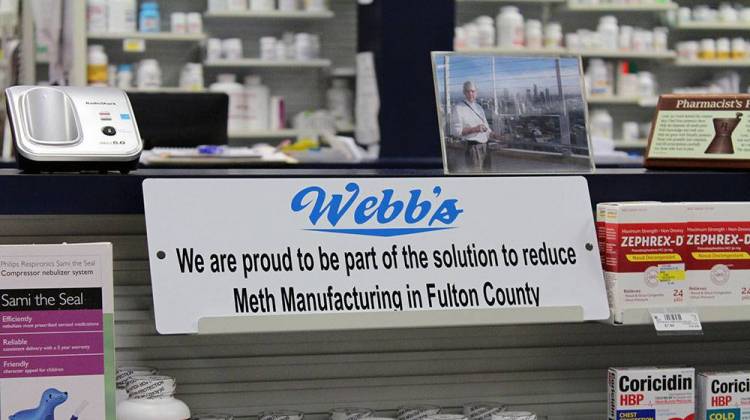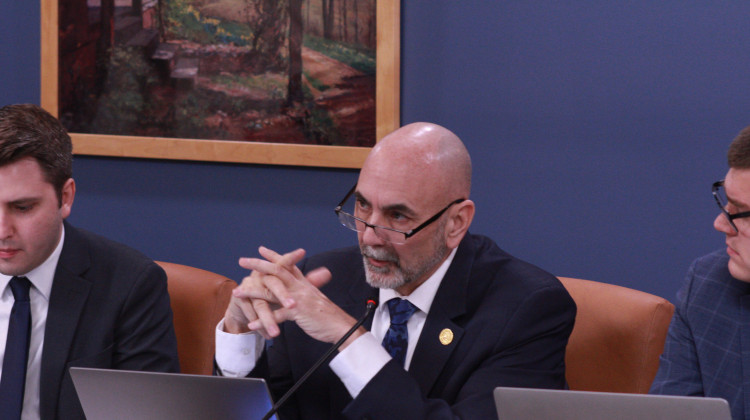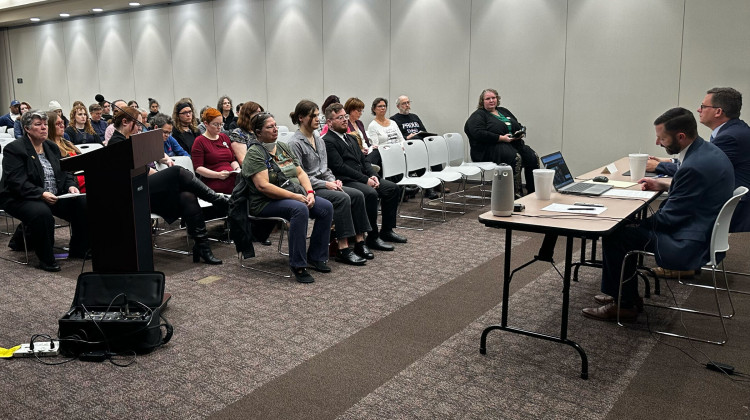ROCHESTER, Ind. -- Harry Webb’s Family Pharmacy in Rochester, Indiana has something you won’t see in many other pharmacies. A sign behind the prescription pick-up counter that reads, “We are proud to be part of the solution to reduce meth manufacturing in Fulton County.”
It refers to a local ordinance that requires pharmacists to talk with customers about alternatives to medicine containing pseudoephedrine, and empowers them to refuse a sale if they suspect a customer is planning to use the medicine to produce methamphetamine.
“We have no money. This is a citizen’s action’s committee, it has no funding from anybody, it’s just all grassroots effort,” Webb explains.
Like many towns in Indiana, Rochester has been fighting a growing meth lab problem. Indiana has been No. 1 in the country for meth lab seizures for a number of years. And state officials expect the same for 2015.
Meth production is a relatively new problem in Indiana. In 1995, six meth labs were found in the state. Last year, there were nearly 1,500.
Those numbers shot up because of the one-pot method – a way to cook meth in small batches using more easily obtainable ingredients. Pseudoephedrine, a decongestant found in some cold medicines, is a key ingredient.
Looking For A Solution
As the 2016 legislative session begins, lawmakers are taking aim at the problem. Two bills will be proposed in hopes of putting an end to meth labs in the state -- one empowers pharmacists to turn away suspicious customers, the other makes drugs containing pseudoephedrine prescription-only.
It’s not the first time efforts have been made to ensure pseudoephedrine sales are going to the right customers.
In 2006, the federal government enacted the Combat Methamphetamine Epidemic Act and put the drugs behind the counter. Indiana took that one step further in 2011, when it began tracking and limiting pseudoephedrine sales.
But Indiana’s meth lab seizures increased in 2012.
Delaware County Prosecutor Jeff Arnold, who works in the county that consistently seizes more meth labs than anywhere else in the Indiana, says the state’s efforts actually made things worse.
“And here’s why,” Arnold said. “You are a meth cooker. You have reached your limit of pseudoephedrine that you can get for the year. I’m a friend of yours, I’ve tried meth. You either pay me or give me some of your product to go out and buy pseudoephedrine so you can cook it. As a result of that you teach me how to cook meth.”
Those friends are what are known as “smurfs.” Smurfing networks often go out in groups, hitting multiple pharmacies to gather as much product as they can.
Two Proposals, One Goal
Back in Fulton County, pharmacy owner Webb worked to fight this. And he got an ordinance passed that mandated pharmacists have a conversation with customers to steer them towards meth deterrent alternatives. It also enabled them to refuse the sale if there is reason for suspicion. It has proven effective – pseudoephedrine sales in the county have dropped 50 percent.
“You know I’ve seen the impact on what it’s doing to our community. It’s costing our county millions of dollars,” Webb said. “There’s another argument going around, ‘Well this isn’t going to end meth.’ And no, it isn’t going to end meth. And yes, the Mexican cartels are going to bring meth into our area. This issue is trying to end meth labs.”
Sen. Randy Head has now authored a bill that would essentially turn Fulton County’s ordinance into statewide law.
“Well, I think it’s important that we do it all over the state, if we leave some place out that’s where all the smurfs are going to go,” Head said.
His proposed bill is based on legislation passed in Arkansas four years ago. The results there have been dramatic. Meth lab seizures before the bill were at more than 300 a year. Four years later, those numbers dropped 90 percent to just around 25.
Chief Operations Officer for the Arkansas Pharmacist Association Scott Pace says there was pushback at first, especially from big retailers.
“We certainly had some pharmacists that said ‘Look, we don’t want to deal with this, this has caused a problem for us,’” Pace said.
He says years later, most seem happy with the results.
The second bill aimed at meth labs in Indiana this session is backed by House Speaker Brian Bosma. It would make pseudoephedrine drugs prescription-only.
Similar bills have been proposed before and failed. Prosecuting Attorney’s Council Executive Director Dave Powell says they didn’t pass because of misinformation. He says rhetoric attacking the prescription-only bill typically references “cold medicines,” as in all cold medicines, when the prescription-only bills only seek to cover those with pseudoephedrine.
“They create this message that creates fear. And it’s not an honest message,” Powell said.
Lawmakers proposing both bills say they would support the other if theirs falls through. The common sentiment between them is that when it comes to meth labs in Indiana, something needs to be done.
 DONATE
DONATE









 Support WFYI. We can't do it without you.
Support WFYI. We can't do it without you.